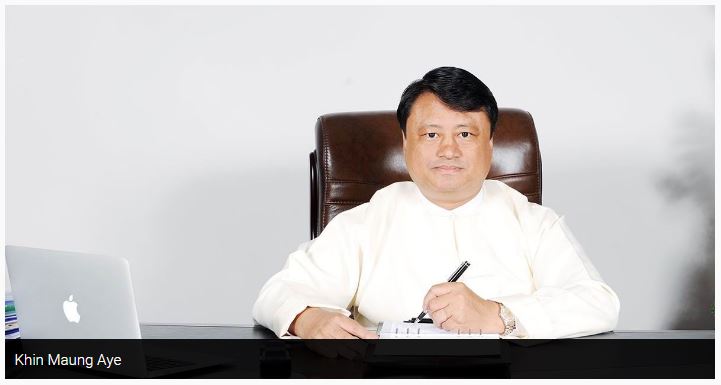Myanmar businesses join hands for FDI
THE MYANMAR Investors Development Association (MIDA), an alliance of large-scale local enterprises, will help the government achieve its economic goals by actively engaging with local and foreign investors, according to its chairman Khin Maung Aye.
”For our country to grow further, we need to create thousands of jobs for our citizens. Job creation entirely depends on investments we receive from local and foreign companies,” he said.
“Foreign investors still have some difficulties investing in Myanmar while local businesses are facing challenges on how to make contact with foreign counterparts. It is still hard for the private sector to ensure proper contacts with foreign investors. That is how we came to realise the urgent need for a medium that can help local businesses and foreign investors get connected.”
With this objective in mind, MIDA was established in early 2015 as a Yangon-based non-profit organisation which aims to create a linkage between the locals and foreigners willing to invest in Myanmar, chiefly in infrastructure and labour-intensive projects.
Focusing on Myanmar’s emerging market and development potential, the organisation aims to provide the latest information and necessary assistance to investors. That would enable them to make important decisions and capitalise on investment opportunities arising out of the nation’s improving political climate.
“We advise foreign companies on various sectors of Myanmar’s economy with high potential for growth,” said Khin Maung Aye.
“We are able to render technical advice to foreign investors as to how to comply with the domestic laws, rules, regulations, notifications, directives and procedures in the most effective and efficient manner,” he said.
“In this regard, we try to connect foreign companies to local professional entities and relevant governmental departments and enterprises. We work closely with a number of government organisations, ministries, the Myanmar Investment Commission (MIC), as well as investment committees in all States and regions.”
Led by Cooperative Bank Limited and KMA Group of Companies, the organisation currently has 32 executive board members and more than 80 members representing big private companies and public companies that invest in all areas of Myanmar, but chiefly covering Yangon, Bago, Mandalay, Tanintharyi regions and Shan State.
“We warmly welcome every investor who is willing to join us in lending a helping hand to the government for ensuring more investment flows into the country. But they should be authorised businesses investing in MIC-approved projects,” he said.
Khin Maung Aye sees tremendous investment opportunities in a range of sectors, including agriculture, forestry, oil and gas, mining, infrastructure, and hotels and tourism. However, the opportunities remain underutilised for various reasons, he said.
“Although foreign investors are aware of the government’s strong political will to open up the country and to create a favourable investment climate through preferential policies and various investment incentives, there has been an information gap between potential foreign investors and local enterprises.
“As a result, prospective investors are not in a position to make informed decisions before investing here without first having comprehensive information on economic statistics, policies, laws, rules, regulations, processes, the investment environment, market conditions and demand – as well as existing and planned projects in Myanmar,” he said.
In this regard, MIDA has planned to organise a series of investment forums at home and abroad. Last year, it held a large forum in Nay Pyi Taw, attracting more than 1,000 participants. Over half of them were foreign investors from international companies, including some billionaires who came to Myanmar’s capital on their private jets.
The organisation also held an investment forum in Japan, which attracted top-10 Japanese businesses. It has the MIC chairman’s approval to hold a similar forum in China in late June, to be followed by a forum in India scheduled for November this year after an invite from India’s envoy.
According to Khin Maung Aye, the organisation has also planned to expand high-level investment forums at the regional level, starting with Yangon this week.
The first-ever Yangon Investment Forum is set for May 9 in cooperation with the Yangon Region Investment Committee and foreign partners including GIZ and PWC Co. There, Yangon chief minister Phyo Min Thein is set to unveil the region’s investment strategies.
“As the event draws near, we see more and more foreign companies register to attend. It is a very good signal that the international community continues to have an interest in doing business here,” he said.
He said similar forums would be held in Mandalay and Nay Pyi Taw later this year.
“We have yet to inform the regional governments of our plan [to organise the forums]. But we believe the authorities will allow us to make it happen,” he said.
He considers Yangon, Bago and Mandalay regions as well as Shan State as the most promising areas for investment growth.
“We sometimes get new ideas from some investors we meet. For one thing, an investor asked me if we would leave the [Irrawaddy] River alone, without any maintenance and proper use for public benefits. That suggestion helped us come up with an idea to save the [Irrawaddy] and to make good use of it for national economic growth,” he said.
Source: http://www.nationmultimedia.com/detail/Economy/30344735


 Thailand
Thailand




